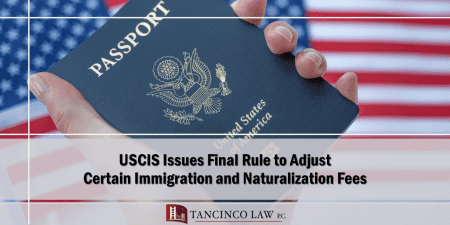WASHINGTON – Today, U.S. Citizenship and Immigration Services (USCIS) published a final rule to adjust certain immigration and naturalization benefit request fees for the first time since 2016. The final rule will allow USCIS to recover a greater share of its operating costs and support more timely processing of new applications.
The final rule is the result of a comprehensive fee review, as required by law, and follows the January 2023 publication of a notice of proposed rulemaking. The review concluded that the current fee schedule falls far short in recovering the full cost of agency operations, including the necessary expansion of humanitarian programs, federally mandated pay raises, additional staffing requirements, and other essential investments.
“For the first time in over seven years, USCIS is updating our fees to better meet the needs of our agency, enabling us to provide more timely decisions to those we serve,” said USCIS Director Ur M. Jaddou. “Despite years of inadequate funding, the USCIS workforce has made great strides in customer service, backlog reduction, implementing new processes and programs, and upholding fairness, integrity, and respect for all we serve.”
USCIS received over 5,400 unique public comments in response to its January 2023 notice of proposed rulemaking. USCIS took into consideration comments and feedback received during the proposed rulemaking process. Acknowledging this feedback from stakeholders, the final fee rule includes several important updates since the initial rulemaking. The final rule:
- Lowers the agency’s required annual cost recovery by $727 million, in part by considering the budget effects of improved efficiency measures;
- Expands fee exemptions for Special Immigrant Juveniles and victims of human trafficking, crime, and domestic violence; U.S. military service members and our Afghan allies; and families pursuing international adoption;
- Provides special fee discounts for nonprofit organizations and small business employers;
- Allows for half-price Employment Authorization Document applications for applicants for adjustment of status and a reduced fee for adjustment of status applicants under the age of 14 in certain situations;
- Expands eligibility for a 50% fee reduction for naturalization applications, available to individuals who can demonstrate household income between 150% and 400% of the Federal Poverty Guidelines; and
- Implements a standard $50 discount for online filers.
Every fee in the final rule is the same or lower than in the proposed rule. For most individual filers, the final rule limits how much newly established fees may increase. Under the final rule, the new fees will not increase by more than 26%, which is equivalent to the increase in the Consumer Price Index since the last fee rule was issued in 2016.
With the new revenues the rule will generate, USCIS will continue using innovative solutions to improve customer experience and stem backlog growth. Although the fee increases announced today will allow USCIS to better offset overall costs, congressional funding continues to be necessary to sustainably and fully address the increased volume of caseloads associated with recent border crossers, including by hiring additional USCIS personnel to help right-size a system that was not built to manage the numbers of cases USCIS receives.
The new fees under the final rule will go into effect on April 1, 2024.
USCIS encourages stakeholders to visit the Frequently Asked Questions page on its website to view a full list of the revised forms that will go into effect on April 1, 2024, along with the new fees. USCIS will accept prior editions of most forms during a grace period from April 1, 2024, through June 3, 2024. During this grace period, USCIS will accept both previous and new editions of certain forms, filed with the correct fee.
There will be no grace period for the following new forms, however, because they must be revised with a new fee calculation. Filers should click the links below to access a preview version of each new form edition before the April 1, 2024, effective date:
- Form I-129, Petition for a Nonimmigrant Worker;
- Form I-129 CW, Petition for a CNMI-Only Nonimmigrant Transitional Worker;
- Form I-140, Immigrant Petition for Alien Workers;
- Form I-600A, Application for Advance Processing of an Orphan Petition (and supplement 1, 2 and 3); and
- Form I-600, Petition to Classify Orphan as an Immediate Relative.
USCIS will use the postmark date of a filing to determine which form version and fees are correct but will use the receipt date for purposes of any regulatory or statutory filing deadlines.
USCIS ANNOUNCES WINDOW FOR H1B CAP REGISTRATION
The fiscal year 2025 (March 2024) H-1B cap registration period will open at noon eastern on March 6, 2024 and run through noon eastern on March 22, 2024. For fiscal year 2025 H-1B cap filings, employers will also have the option of filing Form I-129 electronically on the USCIS website.
On January 30, 2024, USCIS announced a final rule to reduce the potential for fraud in the H-1B registration process. The new rule selects H-1B cap entries by each unique employee, instead of by each registration. This gives each employee the same chance of selection, regardless of how many registrations were submitted on that employee’s behalf.
With this update to the registration process, the employee is required to include valid passport or travel document information, and a employee cannot register under more than one passport or travel document.
USCIS has also provided clarification that for H-1B cap petitions, a start date after October 1 of the relevant fiscal year is allowed.
(Source: USCIS Website-Release Date: 01/30/2024)


